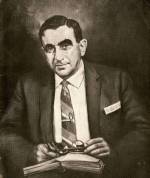Louis Budenz
Barry Commoner
Edward Condon
Norman Cousins
Lee DuBridge
Albert Einstein
Stephen Fritchman
Gunnar Jahn
Willard Libby
Robert Oppenheimer
Ava Helen Pauling
Linus Pauling
Bertrand Russell
Albert Schweitzer
Albert Szent-Györgyi
Leó Szilárd
Edward Teller
Dalton Trumbo
Harold Urey
Henry A. Wallace
Sidney WeinbaumView all Key Participants
|

Portrait of Edward Teller by Dmitri Vail. June 1965.
More Info
Edward Teller1908-2003
Edward Teller Papers, 1954-1997
Location: Hoover Institution Archives. Stanford University.
Address: 434 Galvez Mall, Stanford University, Stanford, CA 94305-6010
Size: 51 ms. boxes, 16 oversize boxes, etc.
Finding Aid: http://www.oac.cdlib.org/findaid/ark:/13030/tf6x0nb1wg
Phone: 650-723-1754 Fax: 650-723-1687
Email: horaney@hoover.stanford.edu Web: http://www.hoover.org/hila/
Correspondence
Pictures and Illustrations
Published Papers and Official Documents
Manuscript Notes and Typescripts
Newspaper Clippings
Quotes
"To my mind, the distinction between a nuclear weapon and a conventional weapon is
the distinction between an effective weapon and an outmoded weapon."
Edward Teller. "The Nature of Nuclear Warfare," Bulletin of the Atomic Scientists, (13). May 1957.
"This alleged damage which the small radioactivity is causing –- supposedly cancer
and leukemia –- has not been proved, to the best of my knowledge, by decent and clear
statistics. It is possible that there is damage. It is even possible, to my mind,
that there is no damage; and there is the possibility, further, that very small amounts
of radioactivity are helpful."
Edward Teller. "Fallout and Disarmament: A Debate Between Linus Pauling and Edward Teller," KQED
television, San Francisco, California. February 20, 1958.
"Our ultimate end must be precisely what Dr. Pauling says, peace based on agreement,
upon understanding, on universally agreed and enforced law. I think this is a wonderful
idea, but peace based on force buys us the necessary time, and in this time we can
work for better understanding, for closer collaboration."
Edward Teller. "Fallout and Disarmament: A Debate Between Linus Pauling and Edward Teller," KQED
television, San Francisco, California. February 20, 1958.
"Peace cannot be obtained by wishing for it. We live in the same world with Russia,
who's leader has said he 'wants to bury us' -- and he means it. Disarmament, the cessation
of tests, will not automatically bring us closer to peace."
Edward Teller. "Fallout and Disarmament: A Debate Between Linus Pauling and Edward Teller," KQED
television, San Francisco, California. February 20, 1958.
"There came in February the issue of Life saying on the cover "Dr. Teller Refutes 9000 Scientists"... I wrote to Life and said first that Teller hadn’t refuted 9000 scientists and second I felt that
they should publish the article that I had written... They sent the article back and
said that they didn’t want it and then I offered it to Look. The editor of Look called me and said they couldn’t get into a controversy with Life. Then I offered it to the Saturday Evening Post and the Ladies Home Journal and Readers Digest and none of them were interested in it. And then I thought, ‘What shall I do? I’ll
have to write a book and see if I can’t get it published.’"
Linus Pauling. Linus Pauling: A Life in Science and Politics, by Ted Goertzel, et al. August 24, 1965. Audio Clips
Video Clips
|

